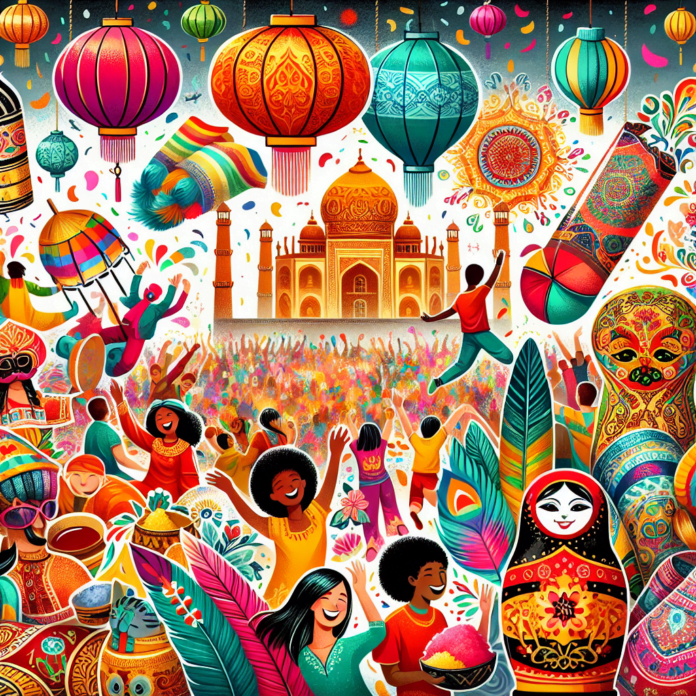Every culture around the world has unique festivities and celebrations. These festivals are a means to honor an event, tradition, memory, or myth that has significant cultural relevance to that society. They are vital components of human civilization and serve the purpose of helping individuals understand their history, cultural values, and traditions. Therefore, the recognition of the cultural significance of festivals globally is crucial for stimulating cultural exchange, tolerance, and global understanding.
The Cultural Significance of Festivals
Festivals embody the shared traditions, practices, ideas, and values that communities, societies, or nations honor. They act as the breath of every culture, giving it life and dynamism.
By celebrating festivals, societies ensure the continuity of their cultural heritage. Festivals often involve rituals, performances, and other traditional activities passed down from generation to generation, providing a link between the past and the present. The legend or story behind each festival is a part of the collective memory of the community, serving as a historical record that adds to their cultural identity.
Festivals promote unity and a sense of belonging among individuals. They offer an opportunity for members of the community to come together, participate in collective activities, and reinforce social ties. Regardless of their background, everyone partakes in the celebration, fostering a spirit of inclusiveness and mutual respect.
Furthermore, festivals stimulate creativity and contribute to cultural innovation. They’re platforms where artists, musicians, dancers, and other creative individuals showcase their works, displaying the rich diversity of their culture. In doing so, they carry forward the artistic legacy of their predecessors while introducing new elements that reflect contemporary times.
Global Examples of Cultural Festivals
Festivals around the world capture the cultural distinctiveness of each society. For instance, Chinese New Year, also known as Spring Festival, is the most significant traditional holiday in China. It celebrates the beginning of a new year on the lunar calendar, with customs like family reunion dinners, red envelope exchanges, dragon and lion dances, and setting off of firecrackers arranging a grand spectacle of Chinese culture.
In India, there’s the vibrant festival of Diwali, also known as the Festival of Lights, which signifies the victory of light over darkness and good over evil. The festival involves numerous cultural and religious rituals, the lighting of lamps and candles, exchange of gifts, and dazzling fireworks displays.
The Day of the Dead in Mexico is another unique cultural festival. It’s a time when Mexican families remember their deceased loved ones and believe that the spirits return to the world of the living. The festival features bright marigolds, sugar skulls, and offerings of food and gifts for the departed.
The Role of Festivals in the Global Context
As cultural institutions, festivals play a significant role in the promotion of intercultural dialogue and understanding. Through exposure to foreign festivals, individuals may appreciate cultural diversity and learn about differing cultural practices and beliefs. This can foster goodwill, mutual respect, and peaceful coexistence among cultures and nations.
Furthermore, festivals are significant in the realm of tourism. People travel worldwide to partake or witness spectacular festivals celebrated in different regions, which stimulates local economies and facilitates cultural tourism.
Conclusion
To sum up, the cultural significance of festivals around the world is immense. They act as a lifeblood of every culture, sustaining cultural identities, promoting unity, and fostering creativity. Also, their role in promoting cultural exchange and understanding in the global context is crucial. By celebrating the festivals of various cultures, we not only enjoy the fervor and excitement they bring but also participate in the grand human saga of cultural continuity and evolution.
Frequently Asked Questions (FAQs)
1. Why are festivals essential to cultural identities?
Festivals allow a community to assert its identity and values. They provide a sense of belonging and offer members a chance to express who they are and honor their shared history and traditions.
2. How do festivals promote cultural exchange and understanding?
Festivals expose people to diverse cultural practices and beliefs. They foster appreciation for cultural diversity, promoting mutual respect and peaceful coexistence among different cultures and nations.
3. How do festivals contribute to economic development?
They stimulate economic activity by attracting tourists, boosting local businesses, and creating job opportunities. Festivals often involve ticket sales, accommodation bookings, food and drink purchases, and souvenir sales, which directly impact the local economy.
4. How can festivals evolve over time?
Festivals often incorporate contemporary elements while remaining rooted in tradition. This fusion enriches the cultural heritage and keeps it relevant and lively for younger generations.

